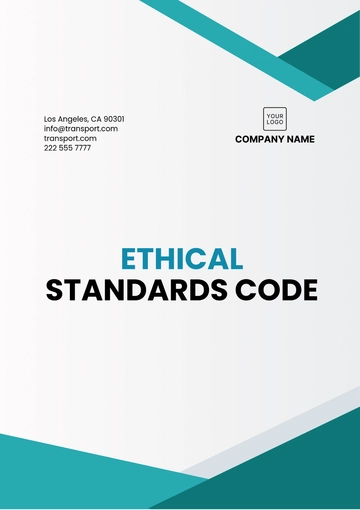Free Awareness Code of Conduct

I. Introduction
As part of our commitment to fostering a culture of environmental responsibility, [Your Company Name] is proud to introduce this Environmental Sustainability Code of Conduct. This document outlines the principles and guidelines that govern our actions as individuals and as a collective towards promoting environmental sustainability. By adhering to this code, we aim to raise awareness, inspire positive change, and contribute to a healthier planet for current and future generations.
At [Your Company Name], we recognize the urgent need to address pressing environmental challenges such as climate change, pollution, and resource depletion. Through this Code of Conduct, we seek to empower our employees to become advocates for environmental stewardship, both within the workplace and in their personal lives. Together, we can make a meaningful difference by embracing sustainable practices and fostering a culture of environmental consciousness.
II. Core Principles
A. Commitment to Education and Awareness
We are committed to promoting understanding and appreciation of environmental issues among our employees and the wider community. This includes providing educational resources, organizing awareness campaigns, and fostering dialogue on topics such as climate change, biodiversity loss, and sustainable development.
B. Minimizing Environmental Impact
We recognize that our actions have consequences on the environment, and we are dedicated to minimizing our ecological footprint. This entails reducing energy consumption, conserving water, minimizing waste generation, and prioritizing the use of sustainable materials and practices in all aspects of our operations.
III. Guidelines for Employee Conduct
A. Workplace Practices
Energy Conservation: Employees are encouraged to turn off lights, computers, and other electronic devices when not in use, and to utilize energy-efficient appliances and equipment whenever possible.
Waste Reduction: Employees should strive to reduce, reuse, and recycle materials in the workplace, and to minimize the use of disposable products such as single-use plastics and paper products.
B. Personal Responsibilities
Transportation: Employees are encouraged to carpool, use public transportation, bike, or walk to work whenever feasible, and to minimize unnecessary travel.
Resource Consumption: Employees should strive to minimize their consumption of resources such as water, electricity, paper, and packaging both at work and at home.
IV. Community Engagement
Promoting Sustainable Practices: Employees are encouraged to participate in environmental initiatives and volunteer opportunities in their local communities and to advocate for sustainable practices in their personal and professional networks.
Educational Outreach: Employees should actively engage with community members to educate them about environmental issues and promote sustainable behaviors.
V. Compliance and Reporting
[Your Company Name] is committed to upholding the principles outlined in this Environmental Sustainability Code of Conduct. Employees who observe violations of this code or have suggestions for improving our environmental practices are encouraged to report them to [Designated Contact Person/Department]. Reports will be treated confidentially and investigated promptly, and appropriate action will be taken to address any issues identified.
VI. Training and Resources
Training Programs: [Your Company Name] will provide training programs to educate employees about environmental sustainability practices and their importance.
Resource Allocation: [Your Company Name] will allocate resources to support employees in implementing sustainable practices, including access to recycling facilities, composting programs, and incentives for eco-friendly behaviors.
VII. Continuous Improvement
Feedback Mechanisms: [Your Company Name] will establish feedback mechanisms to solicit input from employees on ways to improve our environmental sustainability efforts.
Monitoring and Evaluation: We will regularly monitor and evaluate our environmental performance to identify areas for improvement and measure progress towards our sustainability goals.
VIII. Conclusion
By adhering to the principles and guidelines outlined in this Environmental Sustainability Code of Conduct, we can all play a meaningful role in creating a more sustainable future for ourselves and for generations to come. Together, let us commit to making a positive difference for the planet and future generations.
- 100% Customizable, free editor
- Access 1 Million+ Templates, photo’s & graphics
- Download or share as a template
- Click and replace photos, graphics, text, backgrounds
- Resize, crop, AI write & more
- Access advanced editor
Enhance and Discover the Awareness Code of Conduct Template from Template.net, designed to elevate your business ethics effortlessly. This editable and customizable template ensures seamless adaptation to your company's values and standards. Crafted for ease, it's editable in our Ai Editor Tool, making compliance a breeze. Elevate your corporate ethos today





























